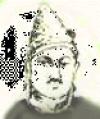Nazeer Akbarabadi poet from India was born in 1735, had 95 years and died in 1830. Poems were written mainly in Urdu language. Dominant movement is theology.
Biography
Nazeer Akbarabadi (or Nazir Akbarabadi) (Urdu: ???? ???? ?????) (real name "Wali Muhammad") was an 18th century Indian poet known as "Father of Nazm", who wrote Urdu ghazals and nazms under nom de plume (takhallus) "Nazeer", most remembered for his poems like Banjaranama (Chronicle of the Nomad), a satire. His father was Muhammad Farooq and his mother was the daughter of Nawab Sultan Khan who was the governor of Agra Fort. Agra, the Indian city, was known as Akbarabad after Mughal emperor Akbar at that time.
Short Biography
Nazeer's date of birth is not certain but most of his biographers believe that he was born in Delhi (then called "Dihli") in 1735 AD. The period of his birth coincided with the decline of the Mughal empire in India. In 1739 Nazeer was still a child when Nadir Shah attacked Delhi and Muhammad Shah Rangeela was arrested. He was later released but countless people were mercilessly killed in Delhi. The horrors of this plunder were still fresh in the minds of people when 18 years later, in 1757 AD, Ahmad Shah Abdali attacked Delhi. People left Delhi for safer cities. Nazeer along with his mother and grandmother also abandoned Delhi and migrated to Akbarabad. At this time Nazeer was 18 years old.
Poetry
It is said that Nazeer?s poetic treasure consisted of about 200,000 verses but unfortunately a bigger portion of it is destroyed and only 6000 verses are available in printed form. No other Urdu poet used as many words as Nazeer did. Nazeer?s poetry conveyed the plight of the common people in their own everyday language and was very popular among the masses. It was due to this lack of the "elite" element perhaps that Nazir's genius was not recognized until much later. But in spite of this neglect, some of his poetic treasure is still available and some of his poems, such as ?Banjaranama? (chronicle of a nomad/gypsy), ?Kaljug nahin karjug hai yeh?, ?Aadmi Naama? (chronicle of man), etc., became immortal. Such poems find their place in school text books and discerning fans of Urdu poetry will not fail to recognize the greatness of Nazeer's verse.
He left for us about 600 ghazals, although his nazms are said to be more worthy of admiration. In fact, Nazeer?s growing popularity is due to his nazms. He was purely a "People?s poet" and his nazms reflected various aspects of the daily life of his age, all types of religious and social events with even minor details in which common people can be seen laughing, singing, teasing, playing. He wrote nazams about religious and social festivals, such as Diwali, Holi, Eid, Shab-e-baraat, about fruits and about animals and birds, about seasons and even inanimate objects, such as paisa, rupaiaa, rotiyaan, aata-daal (meaning "flour" and "lentils"), "pankha" (meaning "fan") and "kakrhi" (a kind of cucumber). He wrote nazms about different aspects of human life, such as "muflisi" (Urdu word meaning "poverty") and "kohrinamah" (chronicle of a leper). The canvas of Nazeer?s nazms is so vast that it encompasses all aspects of human behavior and every person can find nazms that can suit his taste.
Nazeer Akbarabadi?s contemporaries were Mirza Muhammad Rafi Sauda, Mir Taqi Mir, Sheikh Qalandar Bakhsh Jur?at, Inshallah Khan Insha, and Ghulam Hamdani Mushafi. He was young during the age of Sauda and Mir and might be a middle aged man during the age of Jur'at, Insha and Mushafi.
Nazeer died in 1830 AD, at 95.
Though the era of modern nazm credits Altaf Hussain Hali and Muhammad Husain Azad, Nazeer could arguably be considered ?Father of Urdu Nazm? because he preceded them.
Sample Poem
??????"
?? ??? ???? ?? ???? ????? ?? ??? ???? ???? ????
????? ??? ?? ???? ?? ?? ??? ??? ?? ??????
?? ???? ?????? ???? ??? ???? ????? ?? ???? ????
? ? ???? ???? ?? ??? ??? ????? ??? ?? ?? ??? ??
?? ????? ??? ?? ??? ?? ?? ??? ??? ?? ??????
????? ?? ?? ??????? ??? ?? ???? ?????? ?????? ??
?? ???? ??? ?? ?????? ??? ??? ???? ??? ?? ?????? ??
?? ???? ????? ???? ??? ?? ??? ??? ?? ?????? ??
?? ???? ??? ??? ?? ???? ?? ????? ?? ?? ?????? ??
"?? ????? ??? ?? ??? ?? ?? ??? ??? ?? ??????
"The Angel of death
Discard greed and temptations, forget your travels to near and far;
The bandit of death is blowing his trumpet and indulging in looting day and night;
Why are you roaming from place to place with all your paraphernalia;
Not even a twig will eventually go with you when your death arrives;
Your riches and grand life style are all left behind when the angel of death loads you on his back;
Do not feel proud of your swords and shields;
They will abandon you on seeing the spear of death;
Alone in a desert would you then eat the dust of the grave;
In that desert, indeed Nazeer, not even an insect would care to visit you;
Your riches and grand life style are all left behind when the angel of death loads you on his back."
In popular culture
In 1954, Habib Tanvir, wrote and directed his first significant play Agra Bazar, based on the works and times of Nazir Akbarabadi. It used local residents and folk artist from Okhla village in Delhi and students of Jamia Millia Islamia as actors, a play not staged in a confined space, rather a bazaar, a marketplace. ..






